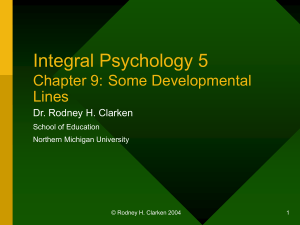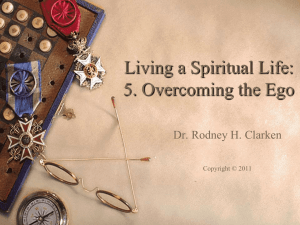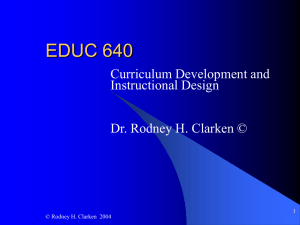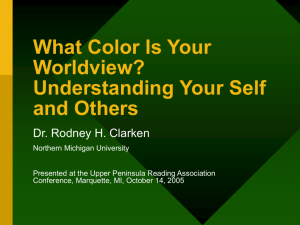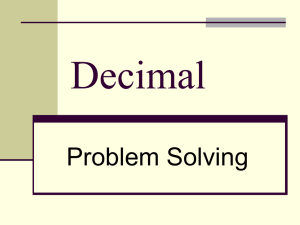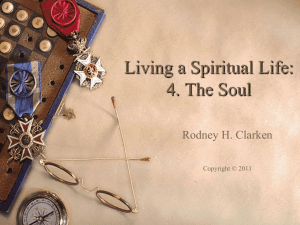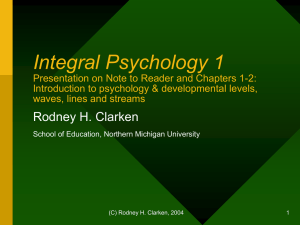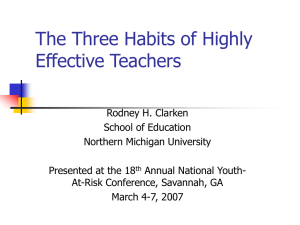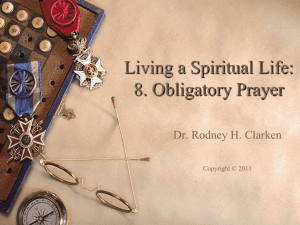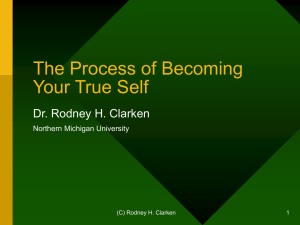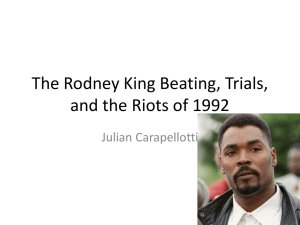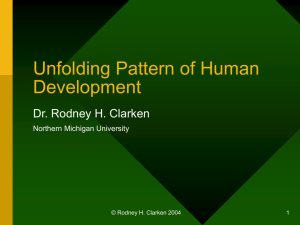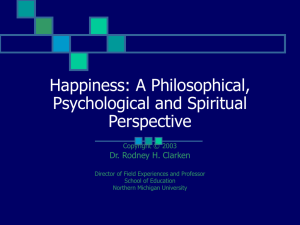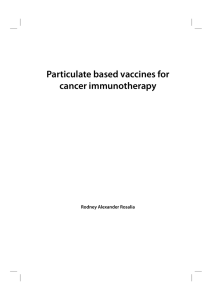Education and Human Values.
advertisement
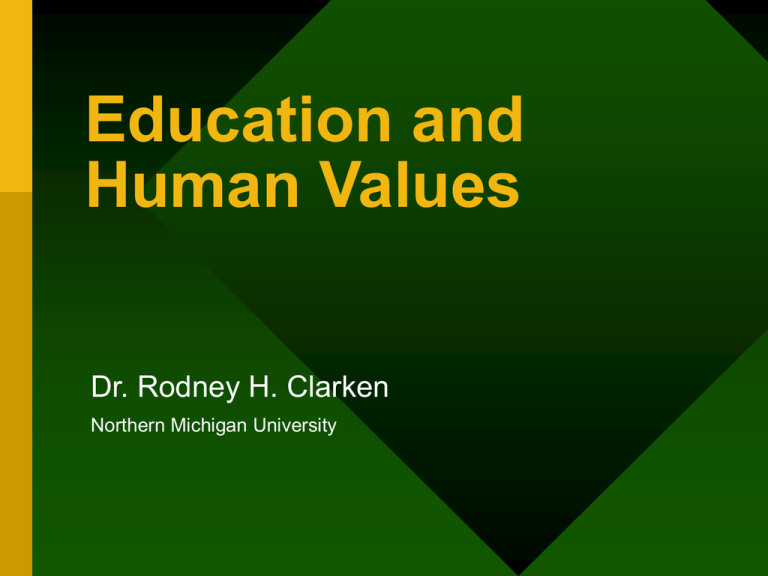
Education and Human Values Dr. Rodney H. Clarken Northern Michigan University Education 1. is a powerful social force. 2. transmits and shapes culture and beliefs. 3. can reveal and develop the potentialities inherent in each individual. 4. can prepare individuals to contribute to the well-being of themselves, their families, their communities, and to humankind as a whole. © Rodney H. Clarken 2006 2 Current education tends • to focus on the many examples of conflict, to undermine faith in human capacity to change, and to reinforce values and patterns of behavior that lead to disunity, injustice, violence: in short, values and patterns which lead to violations of human rights and instability in society. © Rodney H. Clarken 2006 3 Educators • have a powerful influence on people's attitudes and perceptions, and that influence is magnified in the case of children. • can identify, provide and encourage examples of high ideals and achievements worthy of human endeavor, and highlight conditions of injustice with the aim of educating humanity toward their rectification. © Rodney H. Clarken 2006 4 Public education • is an ideal vehicle for the cultivating values that will lead to the protection of human rights and the establishment of peace. • can provide models for children by exalting people who have implemented moral values and a forum for impartial examination of issues and solutions to fulfill their role in promoting the physical, social, mental and moral well-being of the individual and society. © Rodney H. Clarken 2006 5 Individuals and environments are profoundly interconnected. Our relationships, culture, values, social structures and processes all influence and shape us, but we in turn mould and influence our environments. Every abiding change in our lives is the result of mutual interactions between ourselves and our environments. © Rodney H. Clarken 2006 6 Our healthy and full development depends on the nature of our interaction and on the reciprocal relationship between ourselves and the society around us. Without the effort of others, we are unable to develop fully our virtues and talents, but likewise, without personal transformation, lasting social change is impossible. © Rodney H. Clarken 2006 7 Educational systems have not of rid the world of hatred, prejudice, greed and oppression. devoid of basic human values such as love, humility, kindness, tolerance and justice create greater potential for violence and destructive behavior. © Rodney H. Clarken 2006 8 Education programs can 1. foster the development of human values-moral qualities and capabilities--one of the strongest forces both to protect children from destructive behavior and to help create a just and harmonious society in which the rights of all are upheld. 2. find a proper balance between the individual self and society. © Rodney H. Clarken 2006 9 Human values 1. are the building blocks of human personality. 2. are the endowments of every human being and the adornments of the human spirit. 3. in conjunction with the development of skills and abilities, concepts and attitudes, empower us to transform both ourselves and society. © Rodney H. Clarken 2006 10 The full power of human values unless applied universally for the betterment of society as a whole can easily become little more than slogans, at times degenerating even to become excuses for prejudice and injustice. enables us to build a better world, rather than just long for it. © Rodney H. Clarken 2006 11 With proper education we can transcend the unjust and often violent patterns of behavior learned in dysfunctional families and communities, to create a loving, harmonious and just family and community life. Rejecting violence, we can become a facilitator of non-violent conflict resolution, a proponent of true consultation, a bringer of joy and an empowerer of others. © Rodney H. Clarken 2006 12 Education in human values 1. requires an understanding of the essential oneness of humankind applied on a universal basis. 2. constitutes an indispensable foundation for the universal respect for human rights. 3. must be integrated into all aspects of formal and non-formal education. © Rodney H. Clarken 2006 13 Existing school curricula 1. must be revised so that all elements contribute to human values and their development 2. fully recognize the moral implications of personal and social choices. 3. depend upon parents, educators, counselors and others who serve as role models and mentors for children and youth to model and teach human values. © Rodney H. Clarken 2006 14 These programs would 1. address both the process of assisting children and youth to build moral capabilities, and the skills necessary for specific capabilities such as creating a non-violent and harmonious family, consultation, and building unity. 2. build a practical understanding of the oneness of humankind, and equip participants with the skills necessary to promote and actualize that understanding. © Rodney H. Clarken 2006 15 Human Values of Mind, Heart and Will •Knowing Mind •Loving Heart •Serving Will © Rodney H. Clarken 2006 16 Values of the mind: knowing 1. Evaluating one's own strengths and weaknesses without involving ego. 2. Learning from systematic reflection upon action within a consistent framework. 3. Perceiving and interpreting the significance of current events and trends in light of an appropriate historical perspective. 4. Thinking systematically and strategically in search for solutions. © Rodney H. Clarken 2006 17 Values of the heart: loving 1. Imbuing one's actions and thoughts with love. 2. Encouraging others and bringing happiness in their hearts. 3. Cultivating and creating a sense of beauty in every endeavor. 4. Building unity in diversity. © Rodney H. Clarken 2006 18 Values of the will: serving 1. Transcending one's lower passions by focusing on higher purposes and capabilities. 2. Managing one's affairs and responsibilities with rectitude of conduct based on moral and ethical principles. 3. Taking initiative in a creative and a disciplined way. 4. Sustaining effort, persevering and overcoming obstacles. © Rodney H. Clarken 2006 19 Values of mind and will 1. Recognizing relationships of domination and contributing to their transformation into relationships based on interconnectedness, reciprocity, and co-operation. 2. Participating effectively in consultation. 3. Committing oneself to empowering educational activities as a student and as a teacher. 4. Forming a common vision of a desirable future based on shared values and principles, and articulating this in a way that inspires us to work towards its realization. © Rodney H. Clarken 2006 20 Values of heart and will 1. Contributing to the establishment of justice. 2. Serving in societal institutions so as to facilitate the expression of the talents of others that are affected by these institutions. 3. Being a responsible and loving family member as a child, spouse, or parent. © Rodney H. Clarken 2006 21 References The material in the first part of the presentations was adapted from Joint Non-Governmental Organization statement of 35 NGOs submitted by the Bahá'í International Community to the United Nations Commission on Human Rights in Geneva on 23 April 1996 on Agenda item 20(a): Status of the Convention on the Rights of the Child and in the second part from the Nancy Campbell Collegiate Institute Nineteen Leadership Capabilities. © Rodney H. Clarken 2006 22 Contact information Dr. Rodney H. Clarken Director of Field Experiences and Professor, School of Education, Northern Michigan University, 1401 Presque Isle Avenue, Marquette, MI 49855-5348 Tel: 906-227-1881 (o), 226-2079 (h), Fax: 227-2764 Email: rclarken@nmu.edu Website with info on courses, papers, Bahá'í, China, this and other presentations: http://www-instruct.nmu.edu/education/rclarken © Rodney H. Clarken 2006 23 List of Co-Signatory NGOs 1. African Association of Education for Development (AFASED) 1. International Movement ATD Fourth World 2. All India Women's Conference 2. 3. American Association of Jurists International Movement Against all Forms of Discrimination and Racism 4. Defence for Children International 3. International Movement for Fraternal Union Among Races and Peoples 5. Fédération Internationale des Femmes de Carrières Juridiques 4. 6. Fondation France-Liberté International Organization for the Development of Freedom of Education (OIDEL) 7. Human Rights Advocates Inc. 5. Liberation 8. Inter-African Committee on Traditional Practices Affecting the Health of Women and Children (IAC) 6. National Council of German Women's Organizations 7. Susela Dharma International Association 9. International Abolitionist Federation 8. 10. International Alliance of Women Women's International League For Peace and Freedom (WILPF) 11. International Association of Democratic Lawyers (IADL) 9. Women's World Summit Foundation 10. World Association for the School as an Instrument of Peace 11. World Federalist Movement 12. World Federation of Methodist Women 13. World Federation of United Nations Associations (WFUNA) 12. International Association of Educators for World Peace 13. International Association for Religious Freedom 14. International Council of Jewish Women 15. International Council of Women 14. World Movement of Mothers 16. International Educational Development, Inc. 15. World Vision International 17. International Federation of Social Workers 16. Zonta International 18. International Federation of University © Rodney H. Clarken 2006 Women (IFUW) 24
